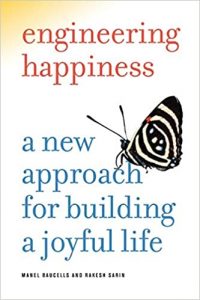Over the last few weeks, people all over the world have been encouraged or required to stay home in an effort to flatten the spread of SARS-CoV-2 and avoid overcrowding the health care systems. One of the results of that extraordinary precautionary measure has been to cause an enormous strain on the world economy.
Another has been to force many people to spend more time with family than they may have been doing on a regular basis. Depending on people’s income, housing, and the structure of their families, this has been relatively easy for some and very difficult for many.
A friend told me today that during the lockdown, his family sat down for dinner every night and this has been a real blessing. In a similar way, many people have gone without a number of things that were part of our normal routine before the emergency.
 In Engineering Happiness, Manuel Baucells and Rakesh Sarin, professors at the University of Virginia and Southern California, make the case that there is enough research and data available to actual quantify happiness and work out the fundamental laws that make people happy.
In Engineering Happiness, Manuel Baucells and Rakesh Sarin, professors at the University of Virginia and Southern California, make the case that there is enough research and data available to actual quantify happiness and work out the fundamental laws that make people happy.
The basic idea is to isolate what the authors call happydons or units of happiness and then to sum up over an hour or month or even a lifetime the number of positive and negative happydons we receive. Someone with an overall positive score will be happy and a negative score will be frustrated, depressed, or sad.
While this sounds overly simple, the book is based on the leading psychological research and seems to apply to all types of people from all kinds of cultures and backgrounds. Baucells and Sarin postulate their six laws of happiness as follows.
The first and most important is that our happiness derived from an experience or an object we acquire is equal to the reality of that experience minus the expectations we had for it. If our hopes are too high we are disappointed no matter how objectively good is the experience.
The second idea or law is that of changing expectations and this has two parts. The first part is that for parts of our lives, expectations increase as things improve for us so that the more we get, the more we want creating an endless race between reality and expectations.
Baucells and Sarin actually distinguish between things that always give us the same pleasure, that they call basic goods, as opposed to others which follow this pattern that they call adaptive goods. In their model the words goods and experiences are interchangeable with the idea that we pay for goods with money and experience with our time.
Basic goods include eating good food, spending time with our partner and family, and perhaps listening to great music as these activities will almost always make us equally happy. Adaptive goods include bigger houses, more luxurious cars, or cell phones with more features.
 In the second place our expectations are often driven by comparing ourselves and our experience to that of other people. We may like our new car but still, feel it is not as nice as our neighbor’s new BMW. Baucells and Sarin also have a name for things which make us happy because of such compares and they call conspicuous goods.
In the second place our expectations are often driven by comparing ourselves and our experience to that of other people. We may like our new car but still, feel it is not as nice as our neighbor’s new BMW. Baucells and Sarin also have a name for things which make us happy because of such compares and they call conspicuous goods.
Baucells and Sarin also say it is important to compare yourself with the right group of people as humans will always make such comparisons.
I know, for example, many people who feel they are underpaid but make much more money than their parents ever dreamed of. The thing is that they compare themselves to their neighbors or peers rather than where they came from. People from wealthy families sometimes have the opposite problem as they compare themselves with their family rather than their peers.
The third law of happiness is that humans have a harder time with loss than with gain so that the happiness curve is a bit lopsided such that we lose more happydons if we lose something than we would get if we received the same thing.
The fourth and fifth laws have to do with diminishing sensitivity and satiation or just being full. All of this affects how we perceive reality and clearly the more we get something the less it might impress us. Even a basic good like our favorite meal may not make us happy if we have just finished lunch.
The final law of happiness is that we tend to impose a short term viewpoint on what makes us happy giving more importance to the emotions of the moment than what will really impact us over time.
While there is much more to the model of happiness, such as the difference between peak periods of joy or pain and the way our memory processes such data, the reason for exploring the model is to encourage you to take careful stock of what really makes you happy in life as the conversation turns to the more practical side of career management which is making enough money to fulfill your dreams and ambitions while still finding time for friends and family.
 As we come out of the emergency and get back to our “normal” life, I suggest it is a good time to reflect on what really makes us happy. Should we continue to go for an evening walk as we have done since first being allowed a few weeks ago? Should we work from home a few days a week since we now know we can?
As we come out of the emergency and get back to our “normal” life, I suggest it is a good time to reflect on what really makes us happy. Should we continue to go for an evening walk as we have done since first being allowed a few weeks ago? Should we work from home a few days a week since we now know we can?
Can we live fulfilled happy lives which are different than the one we were living just a few months ago? They say we should never let a good crisis go to waste and maybe this one can lead to happier lives, at least for some of us.

